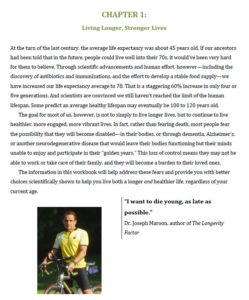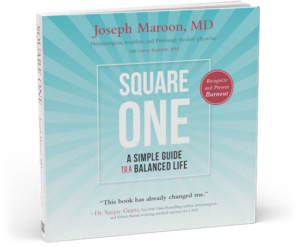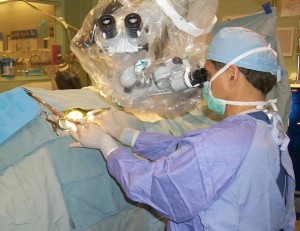LIFE STYLE RISK FACTOR REDUCTION and DISEASE PREVENTION
 To remain “Well” as we age is a challenge that we all may eventually face. Research on brain health and preservation, along with recent advances on the use of nutrition, stress reduction and the benefits of lifelong physical activity, have helped many of us to live longer. As an 8-time Ironman Triathlete, who is still has the desire to compete, I have prioritized a wellness approach my entire life. Several years ago I was asked to put together a workbook and later a book that, step-by-step, tells the reader the secrets I have learned to Live Younger throughout a lifetime.
To remain “Well” as we age is a challenge that we all may eventually face. Research on brain health and preservation, along with recent advances on the use of nutrition, stress reduction and the benefits of lifelong physical activity, have helped many of us to live longer. As an 8-time Ironman Triathlete, who is still has the desire to compete, I have prioritized a wellness approach my entire life. Several years ago I was asked to put together a workbook and later a book that, step-by-step, tells the reader the secrets I have learned to Live Younger throughout a lifetime.
Here are a few highlights
Program Highlights: Lifestyle vs. Genes
(Highlights)
• Simple changes in what you do every day may cut your odds of developing or slowing the onset age-related diseases including Alzheimer’s disease related dementia.
• The goal is to address not just to live longer, but to live a happier and healthier life.
• Learning how our fate or family history is not locked in place by our genes and we have a choice for better brain health.
Background:
Scientific research reveals a new science. It is the science of Epigenetics. Epigenetics is a few words says that our fate is not necessarily locked in place by our genes, rather through our own choices we can take control of our health. Research now shows that diseases commonly associated with aging develop over time and can be influenced by lifestyle factors, such as, amount of social interaction and cognitive stimulation, poor nutrition, reduced sleep and little or no physical activity. Health conditions, such as, cigarette or alcohol abuse, high blood pressure, elevated cholesterol, obesity, depression, prior head injury and lack of certain vitamins and minerals all can be significant risk factors for age-related memory loss and cognitive decline.
What is the science of “epigenetics”?
For decades, scientists believed that our genes controlled every aspect of human life. Genes determined our eye color, our size, our intelligence, and whether or not we would get certain diseases. But groundbreaking scientific studies now reveal that only about 30-‐35% of the chronic diseases we acquire are genetically based. This is really big news, because it means that approximately 70% of diseases that afflict us can be avoided by making good choices about our health and our lifestyles. This groundbreaking science has happened in the new field called epigenetics, which studies how genes are expressed and how that affects our health. In short, while we inherit genes from our
parents, we can control—to a larger degree than ever believed—how those genes function.
And those choices boil down to:
- What we feed our bodies,
- Whether we get enough exercise
- How well we control our stress levels,
- and Whether we avoid environmental toxins.
We make these choices every single day, and turning good choices into good habits is really the “secret” to a potentially longer lifespan and better brain health. Epigenetics (ep’-‐ee-‐jen-‐et’-‐icks) is the study of the changes in organisms caused by how genes function and how they are expressed rather than the genetic code itself. The word comes from Greek roots meaning “beyond genetics.”

The workbook I addressed four areas so critical to our health—
- (1) nutrition,
- (2) exercise
- (3) stress
- (4) and environmental toxins
In my recent book, Square One – A Simple Guide to a Balance life, I introduces the 4 – pillars of better health – appropriate exercise and nutrition, stress reduction and reduction of environmental toxins to preserve organ function and help prevent common age-related diseases, including Alzheimer’s disease.




 Dr. Maroon received an athletic scholarship to Indiana University in Bloomington, Indiana where as an undergraduate, he was named a Scholastic All-American in football. Dr. Maroon has successfully maintained his personal athletic interests through participation in 9 marathons and more than 72 Olympic-distance triathlon events. However, his greatest athletic accomplishment is his participation in 8 Ironman triathlons (Hawaii – 1993, 2003, 2008, 2010, 2013; Canada – 1995; New Zealand – 1997; Germany – 2000), where he usually finishes in the top 10 of his age group. Recently, in July 2012 and 2013, he finished second and third, respectively, in his age group in the Muncie, Indiana half Ironman triathlon. In October 2013 he completed his 5th World Championship Ironman in Kona, Hawaii.
Dr. Maroon received an athletic scholarship to Indiana University in Bloomington, Indiana where as an undergraduate, he was named a Scholastic All-American in football. Dr. Maroon has successfully maintained his personal athletic interests through participation in 9 marathons and more than 72 Olympic-distance triathlon events. However, his greatest athletic accomplishment is his participation in 8 Ironman triathlons (Hawaii – 1993, 2003, 2008, 2010, 2013; Canada – 1995; New Zealand – 1997; Germany – 2000), where he usually finishes in the top 10 of his age group. Recently, in July 2012 and 2013, he finished second and third, respectively, in his age group in the Muncie, Indiana half Ironman triathlon. In October 2013 he completed his 5th World Championship Ironman in Kona, Hawaii.